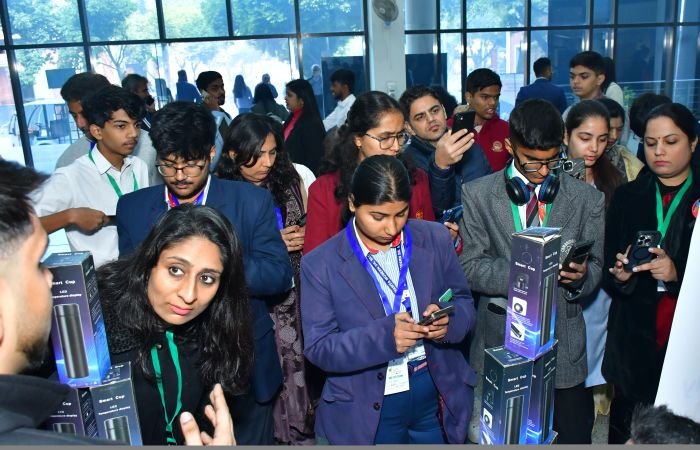A serious aspirant ideally must have completed the syllabus by now. The following points would, however, count. Those who have taken the January Exam and scored 97 percentile or more must work towards improving their rank and improve their Accuracy & Speed. Those who have scored above 90 but less than 97 must do a serious analysis of their mistakes and make a workable plan to improve upon their weaker topics.
The last one month should generally be utilized to consolidate one’s preparation by focusing on revision at a glance, problem solving and overcoming the weaker areas in preparation. However, the following points should be kept in mind:
- Build your immunity to stay physically & mentally fit.
- Remain focused and maintain a positive attitude while studying.
- Develop speed by solving quizzes/Mock Tests of JEE Main level problems with time management.
- Speed & Accuracy will be your key to success in JEE Main
- Take Online mock-test series to build a winning exam temperament.
- Sample papers will give you a fair idea about the pattern of questions and help one improve time management.
- Solve the Previous year’s JEE/AIEEE papers for understanding the level of questions asked.
- Focus on your weaker areas and improve your concepts.
- Remember it is the quality of time spent and not the quantity alone. Hence, take short breaks of five to ten minutes after every one or two hours of serious study. Relax completely when you take a break.
- Practice meditation to develop inner calm, poise, confidence and power of concentration.
- Don’t overstress yourself. Relaxation exercises may help to regain freshness. Avoid over-sleeping during the day.
- For practice of Numerical/Integer Type questions introduced this year follow a reputed source like www.mypat.in or sample papers on JEE Main official website.
- If one has the right “attitude” required towards preparation for the JEE Main, then even an average student can crack it.
- Finally, don’t be nervous if you find the paper tough since it is the relative performance that counts. Put your best analytical mind to work and believe in your preparation.
Time Management: Proper planning is most important for timely preparation and dealing with the study pressure. By now serious students must have evaluated their preparation or informed about the same by their teachers. So, this is the time to consolidate your preparation and ensure that you do extremely well in the actual JEE(Main) exam.
- All the three subjects Physics, Chemistry & Mathematics are equally important. So, divide these crucial remaining weeks aptly in the three subjects
- Prepare a chapter-wise and topic-wise revision schedule.
- Create short notes and list all formulae & points to remember. This will help in quick revision before the examination.
Focus on your Goal: The key to right preparation is proper and timely planning. Toppers learn from their weak areas and practice well in time to improve by all possible means. Correct attitude and acute focus is the key to be a topper. Toppers divide their preparation time accordingly. They stick to a single system of preparation and have faith in themselves. Thus, they gradually build up their confidence level and are geared up to crack any difficult question. They ensure solving all previous years’ papers keeping their concepts crystal clear.
Study Material & Important Topics:
One must not start any new books at this stage. However, one can still refer to standard books for concept clearing. This stage should be utilized more for problem solving, developing short cuts, and memorizing formulae, understanding one’s strengths & weaknesses. Aspirants must take up Mock Tests in CBT (Computer Based Test) mode to develop ones’ self-confidence & exam temperament. Time Management is crucial to score more marks in the actual JEE (Main).
Important Topics in Physics, Chemistry & Mathematics:
The syllabus of class 11th & 12th is
equally distributed across the question paper in JEE Main. However, while you
are preparing all chapters of Physics, Chemistry and Mathematics, stress may be
given on the following topics.
Mathematics: Quadratic Equations & Expressions, Complex Numbers,
Probability, Vectors, Matrices in Algebra; Circle, Parabola, Hyperbola in
Coordinate Geometry; Functions, Limits, Continuity and Differentiability,
Application of Derivatives, Definite Integral in Calculus.
Physics: Kinematics, Gravitation, Fluids, Heat &
Thermodynamics, Waves & Sound, Capacitors & Electrostatics, Magnetics,
Electromagnetic Induction, Optics & Modern Physics.
Chemistry: Coordination Chemistry & Chemical Bonding in Inorganic
Chemistry, Electrochemistry, Chemical & Ionic Equilibrium, Mole Concept in
Physical Chemistry and Organic Chemistry.
Recommendation: Students are advised to avoid selective study in Physics, Chemistry and Mathematics. Generally, all topics are covered as mentioned in the syllabi.
Strategy to Attempt the questions in JEE(Main) Paper:
Sometimes the Right Strategy and Time Management play a vital role in deciding the rank for an aspirant. So, one must be quick enough to adapt to the level of the paper and act promptly. The following points may however be kept in mind when attempting the questions.
Dos for JEE Main 2020-
- Attempt easy questions first.
- Choose sections that have less risk and more gain.
- Carefully scroll through the entire question paper in the first 5 minutes.
- Keep a check on time while attempting the paper
- Attempt all numerical based type questions first as there is no negative marking.
Don’ts for JEE Main 2020-
- Don’t start from
question you don’t know.
- Don’t get upset if any section is tough. You can score in other sections.
- Don’t guess if you have no idea about the concept involved in a question.
- Don’t be nervous if you find the paper tough, since it is the relative performance that counts. Hence, put your best analytical mind to work, it will take you ahead.
Key points that will decide your Rank in JEE Main (Paper-1):
- How well you have mastered the important topics in each of Physics, Chemistry & Mathematics.
- How much practice you have done on similar levels of questions as asked in JEE Main.
- How well you have perfected on your timing of solving an objective type question.
- How much attention you have given to time management & Strategy apart from covering your syllabi.
- How much calm & confident you are when you take up the actual exam.
Tips for the JEE(Main)-Final Exam Day & a day before:
It is important to organize oneself a day before the exam. Considering the COVID -19 prevailing globally it is very important to also take proper care of oneself before you venture for the exam centre the next day. Following should be kept in mind while getting ready for JEE (Main)Exam Day.
- Think positively and don’t discuss about your preparation as
this may indirectly make you nervous even if you are well prepared. Don’t talk
anything about JEE (Main) with others.
- One day before JEE Main, do not study anything new.
- Stay calm, confident and trust yourself.
- Brush up important formulae in all three subjects.
- Say to yourself- “I am excited about JEE Main and I can crack it easily”.
- Relax yourself or indulge in meditation a day before the actual exam in order to give your best on the exam day.
- Don’t ask your friend how much they have studied. It will create unnecessary pressure.
- Have a sound sleep for at least 6-7 hours.
- Prepare yourself to reach the exam centre at least half an hour before the exam starts.
- Ensure to carry your JEE Main 2020 Hall Ticket and follow the instructions as per the hall ticket. Avoid borrowing anything inside the examination hall.
- Finally, it is the relative performance that will matter on the exam day. So, put in your best performance and you will ace JEE Main 2020.
This article has been written by Ramesh Batlish, a FIITJEE Expert

The second phase of JEE Main 2020 for admissions to B.E./ B.Tech (Paper-1) & B. Arch/ B. Planning (Paper-2) earlier scheduled in April, will be now be held between 18th July to 23rd July 2020.
Based on the performance in Paper-1( for B.E./B. Tech. )of JEE (Main)-2020, top 2,50,000 candidates would qualify for JEE (Advanced) 2020 which is now rescheduled for 23rd August, 2020. Admission to IITs will be based on category -wise All India Rank (AIR) in JEE(Advanced) subject to the conditions as would be mentioned in JEE(Advanced)-2020 Website.
The JEE Main Paper 1 will be conducted in 2 sessions per day and the candidates will be allotted slots keeping in mind social distancing and students will also be required to adhere to safety measures while taking the exam. The safety guidelines will be made available to the students in their e- hall tickets which will be issued to the students. For appearing in the JEE (Main) examination there is no age limit for the candidates. The candidates who have passed class 12th / equivalent examination in 2018, 2019 or appearing in 2020 irrespective of their age can appear in JEE (Main) examination – 2020.
Paper-1 ( for B.E./B.Tech aspirants):
According to the JEE Main 2020 exam pattern, Paper 1 for B.E./B.Tech aspirants will comprise of 20 multiple choice questions (MCQs) with One correct option and 5 questions with answer as numerical value with equal weightage to Mathematics, Physics & Chemistry. The marking scheme for MCQs will be +4 for the correct answer, -1 for incorrect answers and 0 for an unattempted question while that for Numerical value questions will be +4 for a correct answer and 0 if incorrect or unattempted. The total marks for this paper will be 300. The duration of the paper will be 3 hrs with total 75 questions including all three subjects. The paper will be conducted in Computer Based Test (CBT) mode only.
Paper-2 (For B.Arch aspirants):
Students aspiring for B.Arch /B.Planning will have to appear in Paper-2 . The Paper-2 for B.Arch aspirants will have three parts. Part-I (Mathematics) of 100 marks with 20 Objective Type – Multiple Choice Questions (MCQs) with One correct option& 5 Questions with answer as numerical value. Part-II (Aptitude) of 200 marks will have 50 Multiple Choice Questions (MCQs) and Part-III(Drawing) of 100 marks will have two questions. The marking scheme for MCQs will be +4 for the correct answer, -1 for incorrect answers and 0 for an unattempted question while that for Numerical value questions will be +4 for a correct answer and 0 if incorrect or unattempted. The total marks for this paper will be 400. The duration of the paper will be 3 hrs with total 77 questions including all three parts.
Paper-2 (For B.Planning aspirants):
The Paper-2 for B.Planning aspirants will have three parts. Part-I (Mathematics) of 100 marks with 20 Objective Type – Multiple Choice Questions (MCQs) with One correct option & 5 Questions with answer as numerical value. Part-II (Aptitude) of 200 marks will have 50 Multiple Choice Questions (MCQs) with One correct option and Part-III (Planning Based Objective Type MCQ) of 100 marks will have 25 Objective Type – Multiple Choice Questions (MCQs) with One correct option. The marking scheme for MCQs will be +4 for the correct answer, -1 for incorrect answers and 0 for an unattempted question while that for Numerical value questions will be +4 for a correct answer and 0 if incorrect or unattempted. The total marks for this paper will be 400. The duration of the paper will be 3 hrs with total 100 questions including all three parts.







